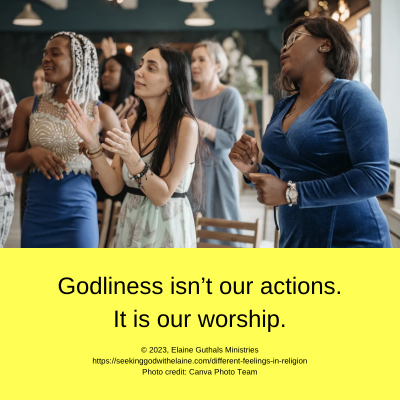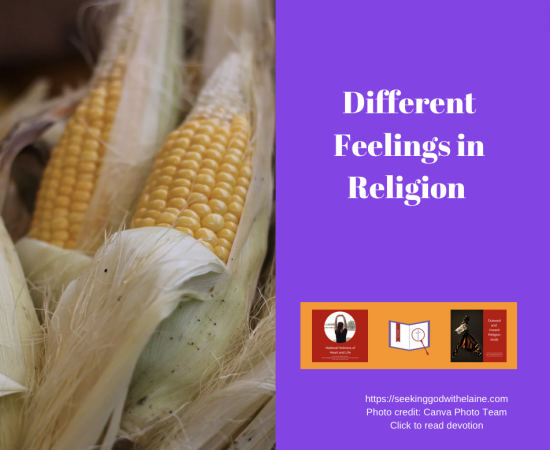As humans, we feel different things. This devotional reading looks at feeling contentment, joy, and bitterness.
Nuggets
- While godliness isn’t a feeling, contentment is.
- Only those who believe in Jesus have joy.

We’ve started looking at Boston’s sermon to find if there are degrees in salvation or if it is a yes/no deal. We wanted to see if we could determine whether Matthew 7: 21 people are goats or sheep.
Boston’s next point was interesting. He wrote, “From the different feeling which those have of the advantage of religion, the ordinances and duties thereof.”
Resource
It kind of threw me when it started talking about our feelings. I think we need to make a choice to follow God, regardless of what we are feeling at the moment.
The second toss was when I read those with empty husks were going to “… abide in the outer court of religion all their days.” What does that mean?
Let's Put It into Context
To read devotions in the Habitual Holiness of Heart and Life theme, click the button below.
Here is a running list of nuggets for the theme.
Devotions in the Outward and Inward Religion study
Here is a running list of nuggets for the study.
We are using Boston’s sermon as the foundation for this series.
Resource
The blue headings are Boston’s words.
Godliness with Contentment
“But godliness with contentment is great gain” (I Tim. 6: 6 ESV)
Some are acquainted with the gain of religion, and, from their own experience, can give a solid reason why they follow it (1 Timothy 6:6).
While godliness isn’t a feeling, contentment is.
We all strive for contentment, regardless of whether we are striving for godliness or not. To me, contentment is more of a feeling. Contentment is being satisfied regardless of the circumstances of our lives. It’s a choice.
Satisfaction is a feeling, like happiness. Joy is a conscious choice to put our faith and trust in God.
But contentment is not the focus of the verse. The subject is godliness with contentment. Godliness, equated with the Old Testament term fear of the Lord, is reverence in thought, feeling, and conduct that is promoted by walking in His Spirit and obeying God’s laws and commandments that produces a moral likeness of God.
I can see that. God wants us to focus on the spiritual, inward transformation rather than the outward religion.
Godliness with contentment keeps our focus on God. We don’t elevate ourselves; rather we exalt God.
At first, things swirled again when Champneys described godliness as the gospel. Paul summed up godliness in I Timothy 3: 16. “Great indeed, we confess, is the mystery of godliness: He was manifested in the flesh, vindicated by the Spirit, seen by angels, proclaimed among the nations, believed on in the world, taken up in glory” (I Tim. 3: 16 ESV).
Resource
So, it is a mystery because godliness has nothing to do with us really. It is about us being obedient to the gospel.
God reveals everything to us. He shows us the way in which our sins are forgiven. He then tells us what He wants us to do with it: witness — telling others about Jesus.
Godliness isn’t our actions. It is our worship.

Isn’t that what religion is about? We are to revere God and submit to Him. Submitting to God is actions by humans that obey God and keep His reasonable, holy, and righteous laws and commandments, follow His purpose for us, and do not follow Satan’s promptings.
We are to humble ourselves before Him.
Our godliness is based on a mystery. South explained that. He wrote, “Instead of evidence springing from things themselves, and clear knowledge growing from such an evidence, his understanding must now be contented with the poor, dim light of faith, which guides only in the strength and light of another’s knowledge, and is properly a seeing with another’s eyes, as being otherwise wholly unable to inform us about the great things of our peace, by any immediate inspection of those things themselves.”
Resource
Our salvation really isn’t about knowledge. It is about faith.
Salvation is the gift of life through the deliverance from condemnation and sin to acceptance and holiness and changes us from being spiritually dead to spiritually alive.
- Sin is not believing that Jesus is our Savior to save us from our actions by humans that disobey God and break one of His reasonable, holy, and righteous laws and commandments, goes against a purpose He has for us, or follows Satan’s promptings.
- Holy means to be set apart — because of our devotion to God — to become perfect, and morally pure while possessing all virtues and to serve and worship God.
- Perfection means we reach a state of maturity because the combination of the spiritual graces form, when all are present, spiritual wholeness or completeness — holy, sanctified, and righteous.
- Spiritual graces are worldly morals that have been submitted to God to further His kingdom instead of enhancing this world.
- Sanctified means to be set free from sin.
- Righteous means we are free from sin because we are following God’s moral laws.
- Pure means not being sinful or having the stain of sin.
- Virtues are standards of moral excellence.
- Perfection means we reach a state of maturity because the combination of the spiritual graces form, when all are present, spiritual wholeness or completeness — holy, sanctified, and righteous.
- Holiness is the transcendent excellence of His nature that includes elements of purity, dedication, and commitment that lead to being set apart.
- Purity means possessing God’s moral character, having eliminated the stain of sin.
- Spiritual death is the spiritual separation from God that occurred as a consequence of Adam and Eve’s original sin.
- The spiritually alive are those who have ABCDed, so they are no longer separated from God.
- Holy means to be set apart — because of our devotion to God — to become perfect, and morally pure while possessing all virtues and to serve and worship God.
Faith is a gift from God and a work of the Spirit that enhances the conviction that the doctrines revealed in God’s Word are true, even if we do not understand all aspects of them, a belief which impacts our lives and distinguishes us from others.
Glossary
The ABCDs of Salvation
If you have not become a believer in Christ, please read through the
Plan of Salvation and prayerfully consider what God is asking you to do.
A – admit our sins
B – believe His Son Jesus is our Redeemer
C – confess God as Sovereign Lord
D – demonstrate that commitment by making any changes needed in our lives to live the way in which God has called us
The Disciple’s Job Description
We’ve got to be content with the lack of knowledge. Our contentment is forged in our submission.
Bradbury made an interesting point. The focus shouldn’t be on whether it is difficult or easy to understand. The focus is on it is a matter of faith.
Resource
Why is it so important that there is this mystery? It isn’t about knowledge or following the checklist.
It is about obedience. We have to obey regardless of what our physical, sinful nature is telling us to show our contrition for disobeying Him in the first place.
That is how we become godly. That leads to the great gain Paul told Timothy about — salvation, regeneration, sanctification, perfection, and eternal life.
Empty Husks
“The heart knows its own bitterness, and no stranger shares its joy” (Prov. 14: 10 ESV)
But unto others all these things are but as empty husks (Proverbs 14:10). They abide in the outer court of religion all their days.
Only those who believe in Jesus have joy.
We have to know ourselves. If we don’t — or are being delusional about who and what we are — we aren’t letting God work in us.
We have to know and confess what are sins are before we can ask forgiveness for them.
Do you think that isn’t always the case? Spurgeon helped us understand this. He wrote, “When the Holy Spirit begins to convince the man of sin, of righteousness, and of judgment, then ‘the heart knoweth its own bitterness.’”
Resource
Non-believers are convicted of their sins. Disciples are convicted of their sins. Backsliders are convicted of their sins.
Backsliding is when those who have made a profession of faith return to their sinful lives.
We only find joy when we have forgiveness of our sins. That only comes through a reconciliation with God. Reconciliation brings the contentment and joy.
Remorse brings the bitterness. We must grieve that we have disobeyed God.
Johnston reminded us that our lives will not be total unicorns and rainbows. He wrote, “The heart that is right with God has much anxiety, disquiet, and sorrow. These are dependent on disposition and temperament” (emphasis added).
Resource
One more time. The heart that is right with God.
Yes, even disciples are going to have anxiety, disquiet, and sorrow. God didn’t promise us a rose garden, especially after we turned away from the Garden He did give us.
If the guilt doesn’t get us, the fear of doing wrong may. Many times, that is wound up in our faulty beliefs in God’s forgiveness. We either think God can’t forgive us because we are too sinful or that He won’t forgive us because we are too sinful.

Making the Connections
What have we gained in telling us who the goats are? And what is Boston really trying to tell us?
Let tackle that last one first. We’ve picked apart what Boston said. Let’s put it back together.
“From the different feeling which those have of the advantage of religion, the ordinances and duties thereof.” Some are acquainted with the gain of religion, and, from their own experience, can give a solid reason why they follow it (1 Timothy 6:6). But unto others all these things are but as empty husks (Proverbs 14:10). They abide in the outer court of religion all their days.
Resource
What this is telling me is some realize what we gain when we accept God’s gift of salvation. These are disciples.
However, there are some to whom these gains mean nothing. At first, I thought these were non-believers.
But that isn’t right, is it? They wouldn’t have outward religion if they were non-believers.
So, what is the abide in the outer court of religion mean? The outer court was where the money changes were. It was where the Gentiles could be. But Jesus also taught there. It was outer part of the temple – but still in the temple.
If I am reading this correctly (and I may be right or wrong), those who have an outward religion will still get to heaven. They are just going to be on the fringes.
How Do We Apply This?
- Respect salvation.
- Argue for incarnation, satisfaction, and resurrection of Jesus.
- Imitate Jesus’ example of godliness.
- Pray for the Spirit to guide us.
- Do our duty and be in God’s service.
- Depend on the Spirit for revelation.
- Diligently read God’s Word for sanctification, not because of curiosity or wanting to explain it.
- Obey God’s Word.
- Get our hearts right with God so that we can gain contentment.
- Get our lives right with God through habitual obedience.
- Take our bitterness to God.
- Seek God in our own hearts.
Searching for and Seeking God
Hearing His Word (Rom. 10: 17)
Reading His Word (Rev. 1: 3)
Praying to Him (Heb. 4: 16)
Studying His Word (Ac. 17: 11)
Meditating on His Word (Ps. 1: 1-2)
Memorizing His Word (Ps. 119: 11)
Resources
Father God. Lord, we don’t want to settle in getting to the outer court of Heaven. We want to be in Your temple, as close to You as possible. That means we have to be living godly lives. Help us to do that. Amen.
What do you think?
Leave me a comment below (about this or anything else) or head over to my Facebook group for some interactive discussion.
If you don’t understand something and would like further clarification, please contact me.
If you have not signed up for the email providing the link to the devotions and the newsletter, do so below.
If God has used this devotion to speak with you, consider sharing it on social media.